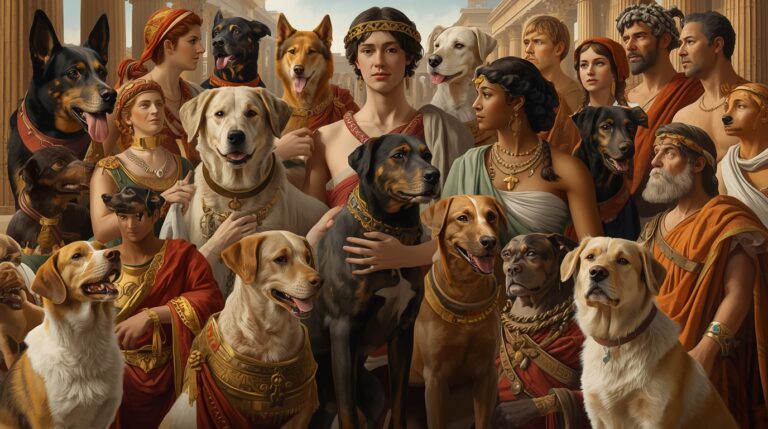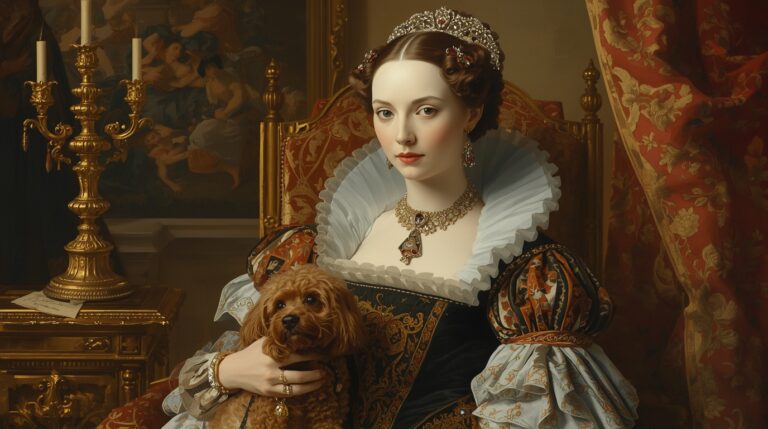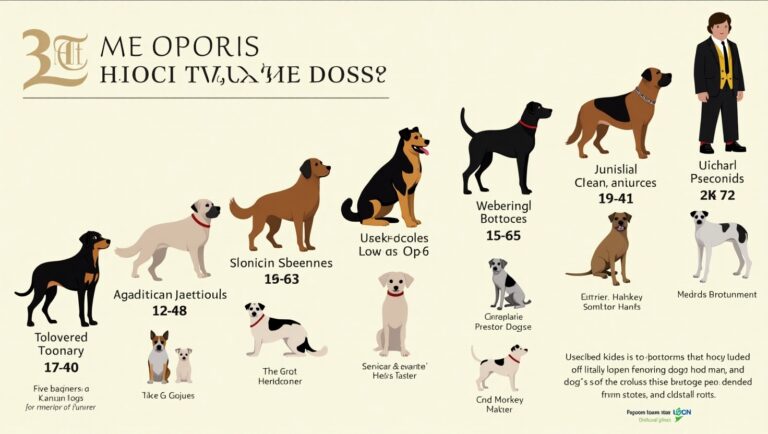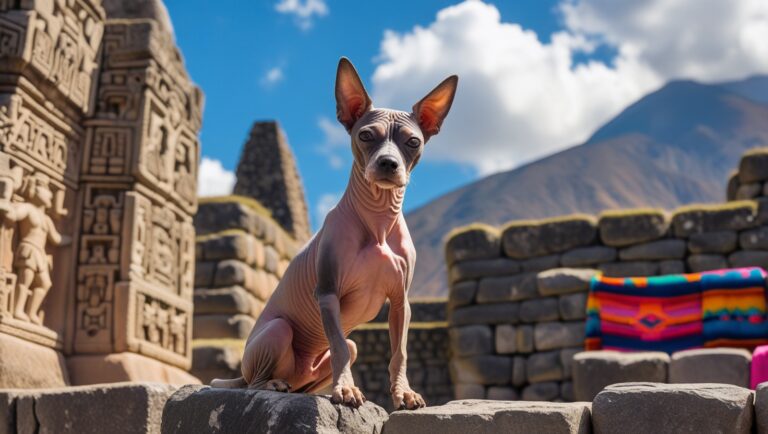Dogs in Mythology, Religion & Folklore
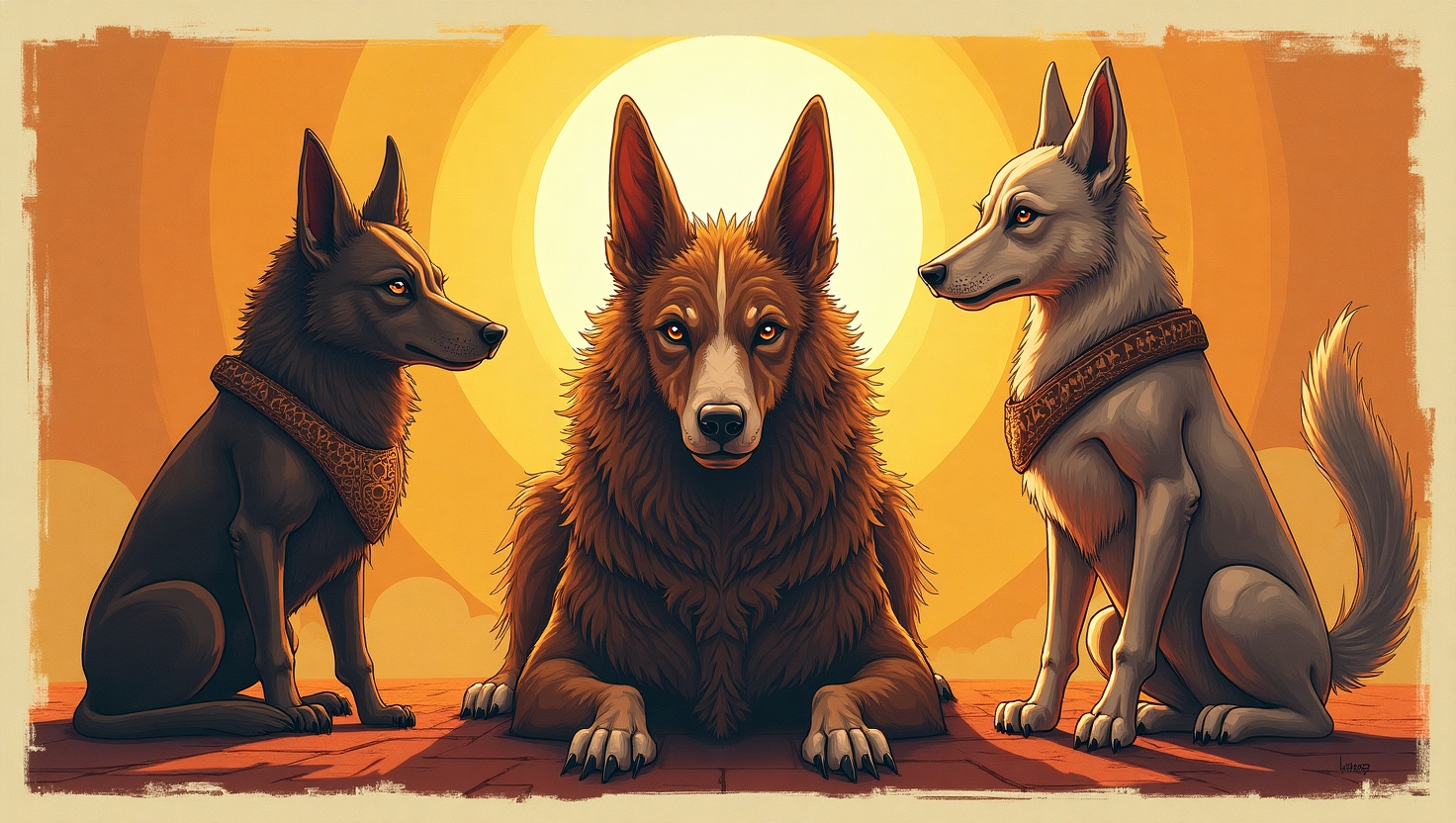
Introduction: The Spiritual Legacy of Dogs
Dogs have been more than mere companions for millennia—they are sacred symbols, mythical guardians, and divine messengers in cultures around the world. From ancient Egyptian tombs to Norse underworlds, from Hindu temples to Native American tribal myths, dogs occupy a spiritual role in human history that transcends mere domestication. Their symbolism encompasses loyalty, protection, death, and divine intervention, making dogs deeply embedded in mythology, religion, and folklore globally.
Dogs in Ancient Egyptian Mythology
The Egyptians held deep reverence for canines, associating them with death, protection, and the afterlife.
Anubis: The Jackal-Headed God
Anubis, a prominent Egyptian deity, is perhaps the most well-known dog-headed god in the ancient world. He has the head of a jackal—a wild canine native to Egypt—and was regarded as the god of embalming and the guardian of the dead.
- He presided over mummification rituals.
- He guided souls to the Duat, the Egyptian underworld.
- Statues of Anubis were placed at tomb entrances to ward off evil spirits.
Dogs were also buried with their owners, signifying their role as guardians in the afterlife.
Dogs in Greek Mythology
Cerberus: The Three-Headed Guardian
In Greek mythology, Cerberus was the three-headed dog guarding the gates of Hades, preventing the dead from escaping. He is one of the most iconic mythological dogs and represents the liminal space between life and death.
Hecate and Her Hounds
Hecate, the goddess of magic, crossroads, and ghosts, was often accompanied by black dogs, which were sometimes sacrificed in her honor.
- Dogs were seen as omens, especially during ritualistic transitions.
- Oracle temples often kept dogs, believing them to possess divine insight.
Dogs in Norse Mythology
Garmr: The Watchdog of Hel
In Norse mythology, Garmr is a giant dog chained at the entrance of Hel, the underworld. He is destined to be unleashed during Ragnarök, the end of the world, fighting the god Tyr in a final battle.
- Dogs in Norse beliefs were buried with warriors.
- They symbolized protection, guidance, and afterlife companionship.
Dogs in Aztec and Mesoamerican Beliefs
Xolotl: Dog-God of the Dead
The Aztecs revered Xolotl, the dog-headed god who guided souls to Mictlan, the land of the dead.
- The Xoloitzcuintli, a hairless dog breed, was considered sacred.
- Dogs were often sacrificed and buried with the deceased to guide them through the nine levels of the underworld.
Xolotl also had associations with Venus, the evening star, and symbolized duality and protection.
Dogs in Hinduism
Dogs are considered divine vehicles in Hindu belief systems, especially linked to Bhairava, a fierce form of Shiva.
Bhairava and His Vahana
- The vahana (vehicle) of Bhairava is a black dog, seen as a protector of dharma.
- Feeding stray dogs on Bhairava Ashtami is considered auspicious and removes negative karma.
Dogs are also considered gatekeepers in various temples, particularly in South India.
Dogs in Buddhism
Buddhism, especially in Tibetan traditions, acknowledges karmic reincarnation where a soul might be reborn as a dog based on past actions.
- Dogs appear in Buddhist cautionary tales as examples of karmic consequences.
- In Tibetan temples, dogs are seen as spiritual guardians.
Some temples even maintain dog monasteries, showing deep reverence toward these animals.
Dogs in Christianity
While not central in Christian theology, dogs appear in Christian folklore, art, and the lives of saints.
St. Roch and His Healing Dog
St. Roch, the patron saint of the plague-stricken, is often depicted with a dog who brought him bread and licked his wounds.
Symbolism in Medieval Texts
- Dogs represented faithfulness and watchfulness.
- In some apocryphal tales, dogs helped martyrs or guarded holy relics.
Dogs in Islam
Dogs occupy a dual status in Islamic culture—viewed as impure in certain legal schools, yet praised for their loyalty and service.
The Cave Dog of the Seven Sleepers
One of the most notable mentions of a dog in Islam is in Surah Al-Kahf, where a group of young believers and their dog sleep in a cave for 309 years.
- Despite general restrictions, dogs are allowed for guarding property and hunting.
- Stories in Persian Sufi literature often use dogs as metaphors for humility and loyalty.
Dogs in Japanese Shinto and Folklore
Inugami: The Dog Spirit
In Shintoism and Japanese folklore, the Inugami is a spirit of a dog, often summoned for protection or revenge.
- Inugami possession is a common trope in Japanese ghost stories.
- Dogs are familiars of certain deities, especially in mountain worship traditions.
The Komainu (lion-dog statues) at shrine gates are also spiritual guardians believed to ward off evil.
Dogs in Chinese Mythology
Tiangou: The Celestial Dog
The Tiangou is a mythical black dog in Chinese folklore that attempts to eat the moon, causing eclipses.
- Dogs in Chinese zodiac represent loyalty, honesty, and justice.
- Dogs often appear in folk tales as protectors of the home and as lucky omens.
Dogs in Celtic and Druidic Lore
Celtic mythology includes sacred dogs who were companions of warriors and hunters.
- Cúchulainn, a legendary Irish hero, killed a dog and had to take its place, earning the name “Hound of Ulster”.
- The Otherworld (spiritual realm) often had hound guardians.
Dogs symbolized bravery, transformation, and the crossing between worlds.
Dogs in Slavic Folklore
In Slavic traditions, dogs are both protectors and portents of death.
- Black dogs were thought to guard treasure or haunt crossroads.
- The Chernobog, a dark deity, was sometimes accompanied by shadowy canines.
Dogs could see spirits, a belief that led to their inclusion in death rituals.
Dogs in African Mythologies
Across various African cultures, dogs take on spiritual, trickster, or guide roles.
Yoruba and Dogon Beliefs
- In Yoruba mythology, dogs are ritual animals often sacrificed in Ifá divination.
- The Dogon people of Mali believe in a cosmic dog that assisted in creation myths.
Dogs act as intermediaries between humans and spirits.
Dogs in Native American Traditions
Many Native American tribes revered dogs as protectors and spirit guides.
- The Navajo believed dogs could ward off evil spirits.
- In Plains tribes, dogs pulled travois before horses were introduced.
They were often featured in vision quests and totem systems.
Dogs in Middle Eastern Folklore
The Seven Sleepers’ Loyal Dog
The dog in the tale of the Seven Sleepers of Ephesus appears in both Christian and Islamic versions, symbolizing loyalty, protection, and divine mercy.
Dogs also appear in Persian epics and Sufi poetry as metaphors for spiritual devotion.
Dogs as Psychopomps
A recurring role for dogs is that of the psychopomp—a being who guides souls to the afterlife.
- Xolotl, Anubis, and Cerberus all serve as psychopomps.
- This role emphasizes dogs’ spiritual function beyond physical life.
Dogs as Guardians and Protectors
Across traditions, dogs are seen as sacred guards—of temples, homes, and souls.
- Komainu statues in Japan
- Cerberus in Hades
- Anubis statues in Egyptian necropolises
This reinforces the symbolism of dogs as threshold keepers between realms.
Dogs as Divine Messengers
In dreams and omens, dogs often signal messages from the divine.
- Black dogs are believed to warn of spiritual danger in British and Irish folklore.
- In Hinduism, a dog in dreams can represent Bhairava or foretell karma results.
Symbolism of Loyalty, Sacrifice, and Protection
The universal thread across cultures is the dog’s loyalty.
- Dogs sacrifice themselves in Greek myths and Aztec funerals.
- They are protectors in Christian legends and Islamic stories.
They symbolize selflessness, devotion, and spiritual service.
Dogs in Modern Religious Symbolism
Even today, dogs feature in:
- Literature exploring spiritual afterlife
- New Age beliefs involving animal spirit guides
- Dream interpretation manuals
Their mythological symbolism remains deeply embedded in the human psyche.
Dogs in Global Folklore: Comparative Analysis
Despite cultural differences, the symbolism of dogs aligns on certain values:
| Trait | Cultures |
| Loyalty | Christianity, Hinduism |
| Guidance | Egypt, Aztec, Norse |
| Protection | Celtic, Shinto, Islam |
| Divine Role | Greek, African, Buddhism |
Dogs serve as mirrors of humanity’s spiritual aspirations across time and geography.
Conclusion: The Mythological Legacy of Dogs
Dogs are not only man’s best friend—they’re gods’ emissaries, guardians of souls, and watchdogs of the afterlife. Their presence in mythology, religion, and folklore speaks to a universal respect for their spiritual roles. From Anubis to Xolotl, from Cerberus to Garmr, dogs bridge the worlds of mortals and gods, the living and the dead.


